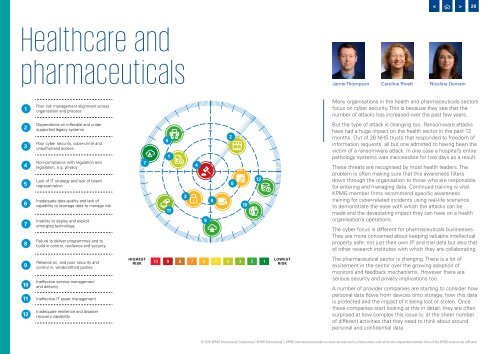Technology risk radar
2mQgADD
2mQgADD
Create successful ePaper yourself
Turn your PDF publications into a flip-book with our unique Google optimized e-Paper software.
20<br />
Healthcare and<br />
pharmaceuticals<br />
Jamie Thompson<br />
Caroline Rivett<br />
Nicolina Demain<br />
1<br />
Poor <strong>risk</strong> management alignment across<br />
organisation and process<br />
Many organisations in the health and pharmaceuticals sectors<br />
focus on cyber security. This is because they see that the<br />
number of attacks has increased over the past few years.<br />
2<br />
3<br />
4<br />
5<br />
6<br />
7<br />
8<br />
Dependence on inflexible and under<br />
supported legacy systems<br />
Poor cyber security, cyber-crime and<br />
unauthorised access<br />
Non-compliance with regulation and<br />
legislation, e.g. privacy<br />
Lack of IT strategy and lack of board<br />
representation<br />
Inadequate data quality and lack of<br />
capability to leverage data to manage <strong>risk</strong><br />
Inability to deploy and exploit<br />
emerging technology<br />
Failure to deliver programmes and to<br />
build in control, resilience and security<br />
7<br />
5<br />
1<br />
11<br />
3<br />
4<br />
9<br />
8<br />
2<br />
6<br />
10<br />
12<br />
But the type of attack is changing too. Ransomware attacks<br />
have had a huge impact on the health sector in the past 12<br />
months. Out of 28 NHS trusts that responded to freedom of<br />
information requests, all but one admitted to having been the<br />
victim of a ransomware attack. In one case a hospital’s entire<br />
pathology systems was inaccessible for two days as a result.<br />
These threats are recognised by most health leaders. The<br />
problem is often making sure that this awareness filters<br />
down through the organisation to those who are responsible<br />
for entering and managing data. Continued training is vital.<br />
KPMG member firms recommend specific awareness<br />
training for cyber-related incidents using real-life scenarios<br />
to demonstrate the ease with which the attacks can be<br />
made and the devastating impact they can have on a health<br />
organisation’s operations.<br />
The cyber focus is different for pharmaceuticals businesses.<br />
They are more concerned about keeping valuable intellectual<br />
property safe: not just their own IP and trial data but also that<br />
of other research institutes with which they are collaborating.<br />
9<br />
10<br />
11<br />
12<br />
Reliance on, and poor security and<br />
control in, vendors/third parties<br />
Ineffective service management<br />
and delivery<br />
Ineffective IT asset management<br />
Inadequate resilience and disaster<br />
recovery capability<br />
HIGHEST<br />
RISK<br />
10 9 8 7 6 5 4 3 2 1<br />
LOWEST<br />
RISK<br />
The pharmaceutical sector is changing. There is a lot of<br />
excitement in the sector over the growing adoption of<br />
monitors and feedback mechanisms. However there are<br />
serious security and privacy implications too.<br />
A number of provider companies are starting to consider how<br />
personal data flows from devices onto storage, how this data<br />
is protected and the impact of it being lost or stolen. Once<br />
these companies start looking at this in detail, they are often<br />
surprised at how complex this issue is: at the sheer number<br />
of different activities that they need to think about around<br />
personal and confidential data.<br />
© 2016 KPMG International Cooperative (“KPMG International”). KPMG International provides no client services and is a Swiss entity with which the independent member firms of the KPMG network are affiliated.


